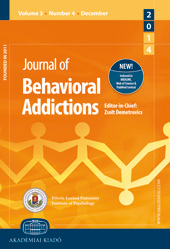Deficits in emotion regulation strategies among problematic and pathological gamblers in a sample of vocational school students
Deficits in emotion regulation strategies among problematic and pathological gamblers in a sample of vocational school students
Author(s): Svenja Orlowski, Anja Bischof, Bettina Besser, Gallus Bischof, Hans-Jürgen RumpfSubject(s): Behaviorism
Published by: Akadémiai Kiadó
Keywords: pathological gambling; problematic gambling; emotion regulation strategies; risk factor; proactive recruitment; unselected sample
Summary/Abstract: Background and aims. Deficits in emotion regulation (ER) are associated with mental disorders. To date, there are hardly any studies focusing on the role of ER strategies in the context of gambling behavior. The aim of this study was to investigate the association between specific ER strategies and pathological as well as problematic gambling in a proactively recruited sample. Methods. A large and unselected sample (n = 4,928) has been screened proactively and systematically in vocational schools. We assessed the Affective Style Questionnaire to measure ER strategies and the Stinchfield questionnaire for assessing problematic and pathological gambling. Associations were investigated with linear and multinomial logistic regression analyses. Results. The analyses showed a significant negative correlation between the subscales “Adjusting” and “Tolerating” and the Stinchfield sum score. Lower scores on these subscales were associated with a higher number of endorsed Stinchfield items. A lower score on the ER strategies “Adjusting” [conditional odds ratio (COR) = 0.95, confidence interval (CI) = 0.91–0.99] and “Tolerating” [COR = 0.95, CI = 0.92–99] led to a higher chance of being classified as a pathological gambler. In problematic gambling, on a subthreshold level, only “Tolerating” turned out to be significant [COR = 0.96, CI = 0.93–0.99]. Discussion and conclusions. For the first time, deficits in specific ER strategies were identified as independent risk factors for problematic and pathological gambling in a large and proactively recruited sample. ER skills, especially acceptance-focused strategies, should be considered in prevention and psychotherapy.
Journal: Journal of Behavioral Addictions
- Issue Year: 8/2019
- Issue No: 1
- Page Range: 94-102
- Page Count: 9
- Language: English

